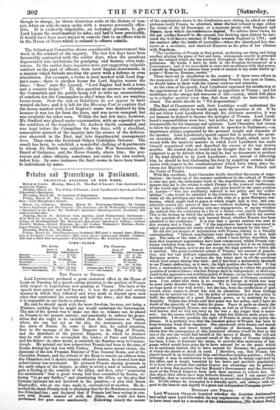The Sebastopol Committee shows considerable improvement this week in the
conduct of the inquiry. The last few days have been favourably contrasted with the earlier days, when the questions degenerated into invitations for gossiping, and became even inde- corous. In the earlier days, inquiries were put suggesting culpable conduct on the part of -officers, from Lord Raglan downwar-ds, in a manner which forbade meeting the query with a defence or even elucidation. For example, a house is seen marked with Lord Rag- lan's name ; there is another house for Lord Raglan nearer the lines; " then," says Mr. Layard, "Lord Raglan had both a town and a country house " To this question no answer is returned ; the Committee and the public being left to infer an accumulation of comforts for the Commander-in-chief when the sick are wanting house-room. Now the sick at Balaklava do not appear to have wanted shelter ; and it is left for the Morning Post to explain that the house marked with Lord Raglan's name was declined by him because it was too far from the lines, and was never occupied, but was available for other uses. Within the last few days, however, Mr. Stafford was placed under examination, with an especial eye to the condition of the hospitals. Dr. Andrew Smith succeeded, and was kept before the Committee for two days; with a steadfast, consecutive pursuit of the inquiry into the causes of the deficien- cies observed in the East, and into departmental management here. Then came the Reverend Sidney Godolphin Osborne. The result has been, to establish a wonderful clashing of departments to whom Dr. Smith was subject—the two War Secretaries, the Board of Ordnance, and the Horse Guards, above him; the pur- veyors and other officials, sometimes not under his own control, below him. In some instances the fault seems to have been traced to individuals by name.


























 Previous page
Previous page